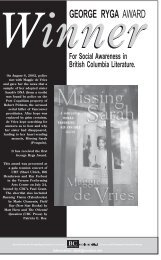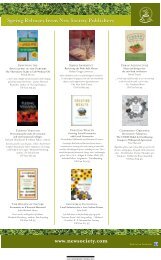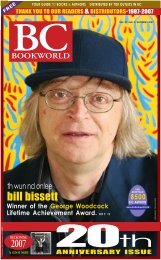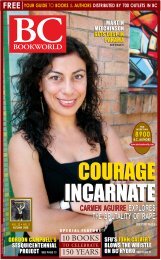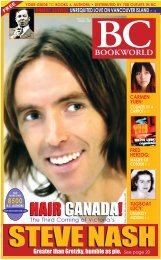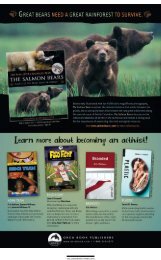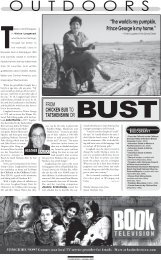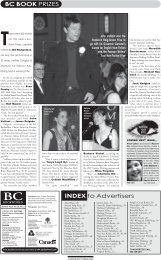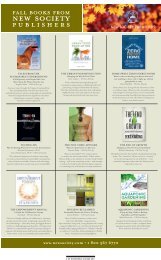BC letters - BC BookWorld
BC letters - BC BookWorld
BC letters - BC BookWorld
You also want an ePaper? Increase the reach of your titles
YUMPU automatically turns print PDFs into web optimized ePapers that Google loves.
PUBLISHING<br />
WHEN JUDITH PLANT PUBLISHED HER FIRST<br />
book, we were living in the mountains<br />
north of Lillooet, where we had<br />
published The New Catalyst magazine for four<br />
years.<br />
Perched on a rocky bluff by the side of a<br />
mountain stream, we generated enough electricity<br />
from a micro-hydro system to power our<br />
household and our fledgling business.<br />
Having to sometimes type by the light of two<br />
candles placed on either side of our portable<br />
Osborne computer, we called this our<br />
Paleotechnic era.<br />
That summer we received a visit from the chief<br />
New Society editor and his partner, who was the<br />
finance manager for their book publishing operation.<br />
They had recently left the East Coast to<br />
open a West Coast office in Santa Cruz, California.<br />
David Albert suggested that instead of<br />
publishing our quarterly magazine on tabloid<br />
newsprint, we should consider packaging the material<br />
in book form. That way it would last longer<br />
and have more shelf appeal.<br />
It was an opportunity we couldn't refuse. We<br />
decided to open up a Canadian office for New<br />
Society Publishers, acquiring editorial projects<br />
ourselves and marketing the whole of NSP’s list<br />
to the Canadian market.<br />
That’s how New Society Publishers Canada<br />
officially opened for business in 1990.<br />
The first project we undertook was to edit,<br />
with our good friends Van Andruss and<br />
Eleanor Wright, the first anthology on<br />
bioregionalism, Home! A Bioregional Reader.<br />
As promoters of the bioregional idea (we had<br />
organized the third continent-wide North American<br />
Bioregional Congress in 1986), this was a<br />
project close to our hearts. We then got to work<br />
on the new series. The first volume involved the<br />
transformation of some past New Catalyst material<br />
into book form. Turtle Talk: Voices for a Sustainable<br />
Future comprised a collection of<br />
interviews we had conducted with key characters<br />
in the sustainability movement that had appeared<br />
in the centerfold of The New Catalyst<br />
magazine. The book came off the press at the very<br />
time that we moved from the Lillooet area to our<br />
new home on Gabriola Island, and we spent many<br />
hours around the dining room table packaging<br />
up copies to send out to our 2000-odd subscriber<br />
list, conscripting my visiting aunt into the mailing<br />
process.<br />
Other volumes followed in close succession—<br />
including Our Ecological Footprint, by Bill<br />
Rees and Mathis Wackernagel. We<br />
released two titles per year, sold by subscription<br />
and direct mail, as well as through the conventional<br />
book trade. We originated other B.C. titles,<br />
too, including Colonialism On Trial,<br />
something of a pre-Manga cartoon record of the<br />
Gitksan Wet’suwet’en land claims court case, and<br />
Clayoquot Mass Trials which documented a watershed<br />
phase in the environmental movement.<br />
✍<br />
For the next couple of years or so, we learned<br />
the basics of book publishing, alongside advanced<br />
study in business cooperation. New Society was<br />
organized as a collective and our task was to insert<br />
ourselves into their management structure<br />
from a distance. There was no e-mail at the time<br />
and communication was a challenge, to say the<br />
least. Nevertheless we managed our tiny<br />
transnational corporation from three locations<br />
with remarkable ease.<br />
The fax machine was a revolutionary tool that<br />
simplified our lives tremendously. We gathered<br />
once a year at an annual face-to-face meeting,<br />
and governed ourselves by means of a very unusual<br />
mutual aid agreement. We were publishing<br />
books to build a new society and running our<br />
lives according to the same values we espoused<br />
in our publications. These were heady times indeed.<br />
Chris Plant<br />
and Judith<br />
Plant on<br />
Gabriola<br />
Island, 1997<br />
How the<br />
activist agenda<br />
of New Society<br />
Publishers has<br />
been embraced<br />
worldwide<br />
FROM CANDLELIGHT<br />
TO LEADING LIGHTS<br />
Twenty years ago, when Judith Plant published her first book, Healing the Wounds: The<br />
Promise of Ecofeminism with New Society Publishers in Philadelphia, she and her partner<br />
Chris Plant wrestled with a publishing decision that changed the course of their lives,<br />
leading them out of the backwoods to the forefront of the Sustainability Movement. Here<br />
Chris Plant recalls the evolution of their remarkable imprint.<br />
At a face-to-face meeting in Philadelphia in<br />
1995, we learned very suddenly that the Philadelphia<br />
office was basically bankrupt. Unless someone<br />
stepped up to the plate, the publishing<br />
operation overall would be forced to close. Unlike<br />
the key players in the Philadelphia collective who<br />
seemed tired, we were not ready to stop publishing—on<br />
the contrary, we were just getting going.<br />
The only thing to do was to take over the<br />
whole operation. We were organized as non-profits<br />
at the time, and at first we tried raising the<br />
necessary capital through charitable means. But<br />
good fortune stepped in at the right time in the<br />
form of an angel investor, Joel Solomon (this<br />
angel had been on our mailing list from the beginning<br />
of The New Catalyst days), and so in<br />
1996 Gabriola Island became the international<br />
headquarters of New Society Publishers.<br />
We bought just over 50 percent of the NSP<br />
list along with the U.S. distribution infrastructure<br />
and a whole lot of goodwill. Not everyone<br />
was entirely pleased that New Society had become<br />
a Canadian enterprise, however, and our<br />
task became that of convincing authors and others<br />
that we could continue to be an effective social<br />
change publisher from north of the border.<br />
New Society had started as a social movement,<br />
opposing the war in Vietnam, nuclear weapons<br />
and nuclear power, and publishing pamphlets<br />
on peace and nonviolence,<br />
civil disobedience, conflict<br />
resolution and social<br />
change. Their early books<br />
focused on nonviolence,<br />
feminism and alternative<br />
economics.<br />
When we entered the<br />
picture, we added an environmental<br />
focus. Now we<br />
needed to reinvent the<br />
company and did so<br />
around the emerging idea<br />
of sustainability which, in<br />
our eyes, combined all of these interest areas and<br />
more. The question was whether we could sustain<br />
a values-based publishing operation while<br />
making sustainability successful in the business<br />
world.<br />
It didn’t help that, not too long after we purchased<br />
the company, InBook, our U.S. trade distributor,<br />
went bankrupt. It also didn’t help that<br />
postal rates climbed dramatically as mail subsidies<br />
were gradually eroded—a kiss of death for<br />
the direct mail sales on which the company had<br />
been built.<br />
Switching to Consortium for our U.S. trade<br />
presence was a major relief: they were well-organized<br />
and effective. But our attempts to support<br />
trade sales by religiously attending BEA,<br />
ALA and the like drove us to despair.<br />
Slowly, we realized that, as an activist publisher,<br />
we had to be where the activists were, not<br />
try to compete in the glitzy corporate world of<br />
trade bookselling. We switched strategies, making<br />
it our business to be at renewable energy fairs,<br />
Green festivals, natural building colloquia and a<br />
myriad other events where we could network<br />
with the people who needed the material we were<br />
publishing for their organizing work—and who<br />
were writing the material we wanted to publish.<br />
In the early years of this period, we continued<br />
publishing The New Catalyst as an occasional<br />
free broadsheet, distributed in tens of thousands<br />
of copies. Inside was our catalog of New Society<br />
books. Direct mail continued to be a major source<br />
of revenue, and early employees—and the occasional<br />
family member—took phone orders and<br />
packed books in the crowded little office next to<br />
our home.<br />
We nervously borrowed money against the<br />
property to build the company, and slowly added<br />
staff. I was doing the editorial and production<br />
work; Judith masterminded finance and marketing;<br />
and we both made acquisition decisions.<br />
Judith Plant typesets by candleight, 1988<br />
Sustainability was a hard sell but we relentlessly<br />
released books on sustainable communities, simple<br />
living and eco-cities alongside critiques of economic<br />
growth, manuals on progressive leadership<br />
skills (facilitation, mediation, group process and<br />
the like), and parenting and education resources.<br />
Thinking of ourselves as a progressive business,<br />
we even ventured into business publishing<br />
with a series called Conscientious Commerce that<br />
highlighted the ways in which the corporate world<br />
could contribute to environmental and social<br />
sustainability. Importantly, we walked the talk<br />
ourselves, committing, in 2001 with the release<br />
of Stormy Weather: 101 Solutions to Global Climate<br />
Change by Guy Dauncey, to printing<br />
all of our books on 100 percent Post Consumer-<br />
Waste paper and, a few years later, going carbonneutral.<br />
We estimate, as of 2008, our pulp<br />
nonfiction business has saved over 13,000 trees.<br />
For many years we existed on a very uncomfortable<br />
financial edge. But we were slowly building<br />
our market and our reputation. When peak<br />
oil first emerged as a crucial topic for the future<br />
of industrial society, we were there with one of<br />
the first books on the topic, The Party’s Over: Oil,<br />
War and the Fate of Industrial Society, by Richard<br />
Heinberg.<br />
When 9/11 happened, we released a major<br />
exposé on the topic, linking the event to peak<br />
oil, that sold strongly. We<br />
added important renewable<br />
energy books to our<br />
categories of interest, as<br />
well as a line of natural<br />
and green building titles<br />
that caught the emerging<br />
Green building wave before<br />
it became merely<br />
fashionable.<br />
Sales increased. We<br />
added staff. We added<br />
buildings. We almost<br />
doubled our output of titles<br />
per year. We gained some recognition for our<br />
efforts through two Ethics in Action awards for<br />
our social and environmental initiatives, and the<br />
<strong>BC</strong> Publisher of the Year award in 2003. In a<br />
note attached to the award, Jim Douglas praised<br />
“the international quality of our list.”<br />
And we began to make money. Always five to<br />
ten years ahead of the mainstream, our books rapidly<br />
gained relevance for a wider audience as the<br />
early years of the new millennium came to pass,<br />
and sustainability was suddenly the name of the<br />
game. As “green” became the color of choice, sales<br />
rose steadily, and we realized we had moved into<br />
a new phase.<br />
✍<br />
At last, the sustainability publisher had become<br />
financially sustainable. But we were tired.<br />
We wanted our freedom back—including freedom<br />
from the anxiety of running a publishing<br />
business in a volatile market. So with considerable<br />
trepidation, we put New Society up for sale.<br />
It was a relief when the final purchaser turned<br />
out to be Douglas & McIntyre. Their list had<br />
integrity and we had obvious compatibilities with<br />
their Greystone imprint, David Suzuki’s publisher.<br />
More to the point, they were demanding<br />
no radical changes in the way the company was<br />
run. With our on-going mentoring, our loyal and<br />
highly capable staff will gradually take over the<br />
management of New Society. It looks like a winwin<br />
situation.<br />
Judith and I never really intended to be Publishers<br />
for Life, and we certainly weren’t business<br />
people at heart. In 1990, we had made a conscious<br />
decision to do our bit for the “turn-around<br />
decade” that was called for by David Suzuki and<br />
others. But somehow that turn-around decade<br />
has turned into almost two decades…<br />
Now it’s time for us to be doing more of the<br />
things we were publishing about. So we're forging<br />
ahead with a new chapter...<br />
22 <strong>BC</strong> BOOKWORLD • LOOKOUT • SUMMER • 2009 23 <strong>BC</strong> BOOKWORLD • LOOKOUT • SUMMER • 2009



